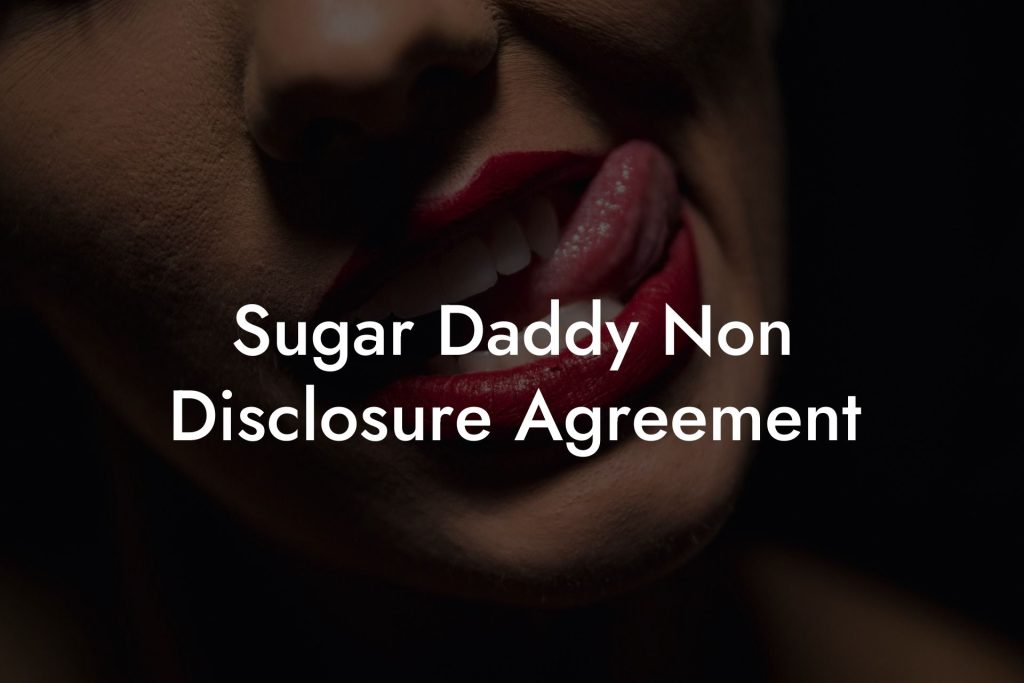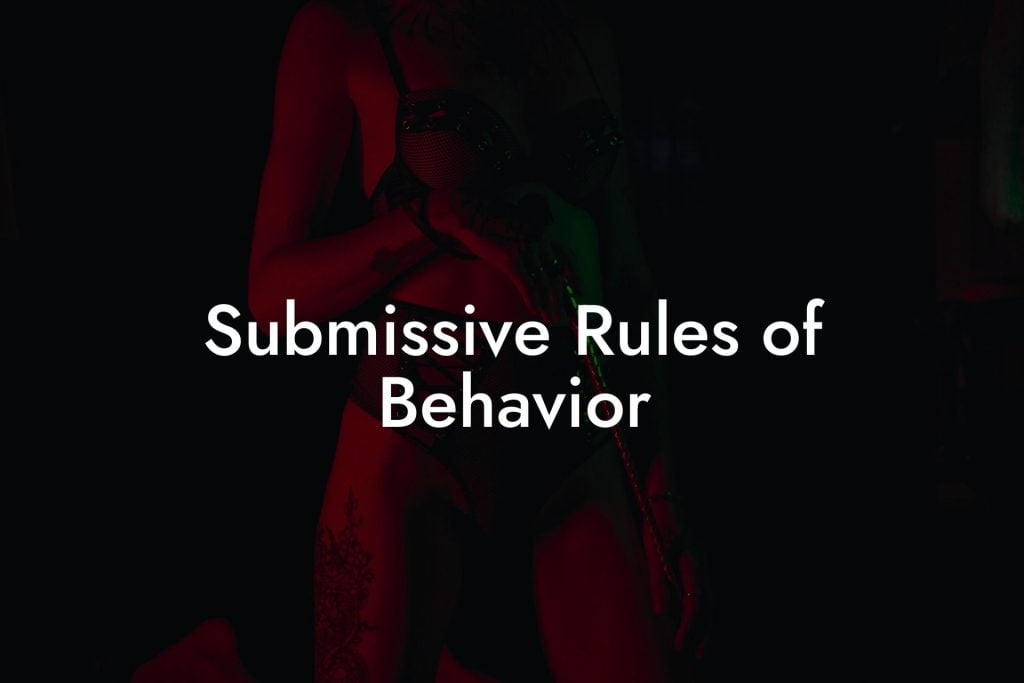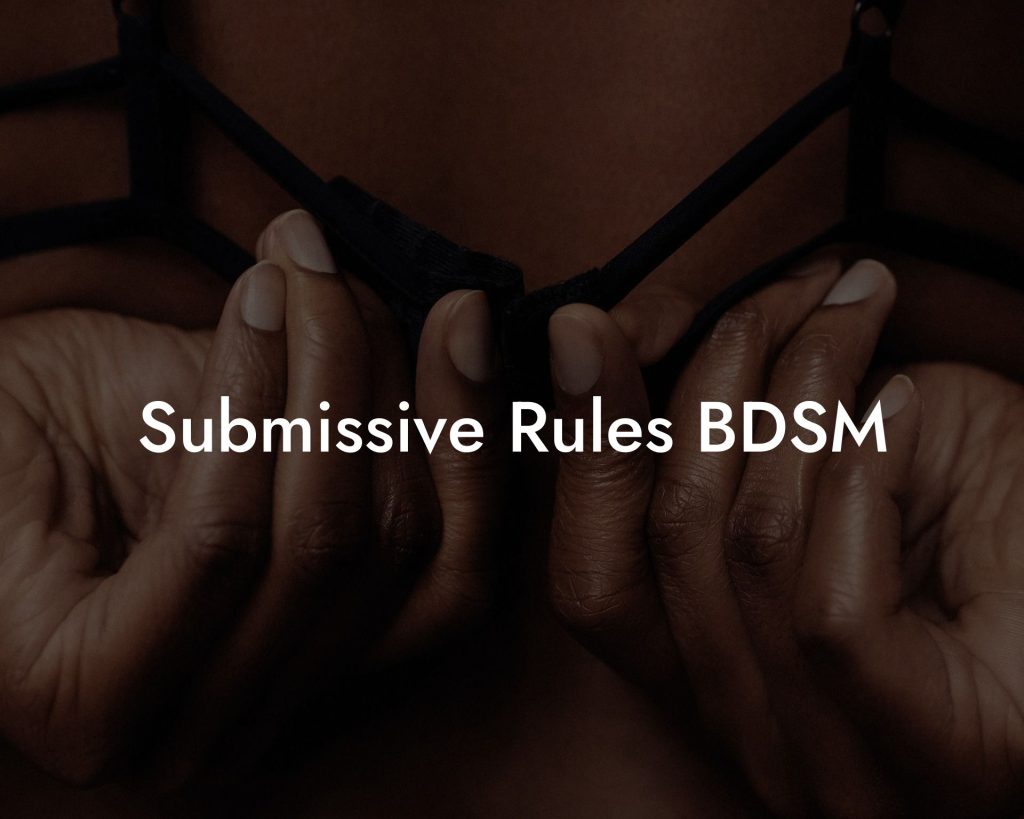In the world of BDSM, establishing a Dominant and Submissive Agreement is crucial to ensure a healthy power dynamic. This agreement serves as a foundation for communication, consent, and the exploration of boundaries between partners. Whether you're a seasoned kink enthusiast or simply curious about the lifestyle, this comprehensive guide will provide you with valuable insights into creating a successful Dominant and Submissive Agreement.
In any BDSM relationship, consent is the cornerstone of trust and respect. It’s more than just saying “yes” or “no”—it’s about openly communicating your desires, limits, and expectations. But trust doesn’t end with a conversation—it’s built through ongoing, clear agreements. That’s where our Dominant & Submissive BDSM Contract Pack comes in. Find out more →
Dominant and Submissive Dynamics
- Understanding the power exchange: Unveiling the core principles behind a Dominant and Submissive relationship and the importance of clear roles and responsibilities.
- Roles and expectations: Delve into the various roles within this dynamic, including Dominants, submissives, switches, and their respective expectations within the BDSM framework.
- Negotiation and consent: Emphasizing the significance of negotiation and verbal consent to establish healthy boundaries, safe words, and limits before engaging in any form of play.
- Communication and trust: Exploring the vital role of open and ongoing communication in building trust and ensuring the emotional and physical well-being of both partners.
Looking for the best BDSM & Kink OnlyFans content creators? Here is a list of of our favourites that you will love:
-
- Best BDSM & Fetish OnlyFans - Molly✨ >> Link
- Best BBW & Huge Ass OnlyFans - Naughty Hanna Zimmer 💜🎀 >> Link
- Best Sexy Gaming Nerd OnlyFans - 🎮 Gracy EstuSWEET 🎮 >> Link
- Best Fetish & Kink Messaging OnlyFans - 💫Lola La Fleur 💫 >> Link
- Best Girl Next Door OnlyFans - ☀️Lily ⛅ >> Link
- Best Tiny European OnlyFans - 💝 Ami Allison 💝 >> Link
- Best Cosplay OnlyFans - 🐱 Little Kitty Kate 👉👌 >> Link
- Best Little OnlyFans - 🧸 Katya 🙇♀️ Sun >> Link
- Best Sub OnlyFans - 🍌Hanna Banana🍌 >> Link
- Best Teen & Huge Tits OnlyFans - ❣️Anny❣️19 y.o. BUSTY student girl >> Link
- Best Tiny Tits OnlyFans - ⍣⭐️ Sofia Parker ⭐️⍣ >> Link
- Best Sub & Huge Boobs OnlyFans - Nika Huge Boobs >> Link
- Best Kink OnlyFans - Sofia💖 >> Link
- Best Fetish & Girl Next Door OnlyFans - Hillary is Wet 💦 >> Link
- Best Dirty Latina OnlyFans - Paula Flores 😈 >> Link
Not quite what you are looking for? View the full list →
Creating a Dominant and Submissive Agreement
- Components of the agreement: A detailed breakdown of what should be included in a Dominant and Submissive Agreement, such as personal limits, sexual preferences, punishments, and rewards.
- Establishing rules and protocols: Discussing the importance of setting clear rules and protocols to maintain structure and control within the power dynamic.
- Safe words and signals: Highlighting the necessity of safe words and signals for submissives to effectively communicate their limits during play.
- Periodic review and renegotiation: Stressing the need to periodically review and renegotiate the agreement to accommodate personal growth, evolving desires, and changing boundaries.
Frequently Asked Questions
What exactly is a BDSM contract?
A BDSM contract is a written agreement between consenting adults that outlines the expectations, limitations, and responsibilities of a BDSM relationship. It can include specific details about roles, safe words, limits, and the duration of the contract. These contracts are used to reinforce trust, clarify consent, and ensure that all parties are explicit about their intentions and boundaries.
Is a BDSM contract legally binding?
No, BDSM contracts are not legally binding in the same way as civil contracts. They are more symbolic and are used as a tool to negotiate and communicate within the relationship. However, they do reflect serious consent, agreement, and commitment, which can have personal and sometimes legal implications regarding consent.
How does consent work within BDSM?
Consent in BDSM is a crucial element that distinguishes BDSM activities from abuse. It is given freely, without coercion, by all parties, and it can be revoked at any time. Consent is informed and specific to the activities discussed and agreed upon within the relationship or scene.
Can a submissive withdraw their consent during a scene?
Yes, a submissive, or any party in a BDSM interaction, has the right to withdraw their consent at any point during a scene or relationship. Safe words or gestures are often used to signal a withdrawal of consent or a need for immediate stoppage of the activity.
What is a safe word, and why is it important?
A safe word is a predetermined word or phrase that participants in a BDSM scene can use to communicate their need to slow down, adjust, or stop the play immediately. It is an integral part of maintaining consent and safety during BDSM activities.
What are hard and soft limits in BDSM?
Hard limits are non-negotiable boundaries that must not be crossed under any circumstances. Soft limits are boundaries that are not as rigid and may be explored, given proper consent and precaution. Limits must be respected to maintain trust and safety.
How do trust and negotiation fit into BDSM dynamics?
Trust is the foundation of any BDSM relationship; without it, the dynamic can’t function safely or effectively. Negotiation is the process by which all parties communicate their desires, limits, and expectations to build that trust and create a consensual and mutually satisfying experience.
Is there any safety training involved in practicing BDSM?
Yes, it is generally advised that individuals seeking to engage in certain BDSM practices undergo some form of safety training. This can include learning about safe words, restraints usage, impact play techniques, and first aid, as well as understanding psychological implications.
How does one approach setting up a BDSM contract?
Setting up a BDSM contract involves open and honest communication. It is essential to discuss interests, fantasies, limits, health concerns, and expectations. The contract should be written down and agreed upon by all parties involved.
Can a BDSM contract be changed?
A BDSM contract is not set in stone and can be renegotiated at any time. It is important for all parties to regularly discuss their experiences and update the contract as necessary to ensure that the arrangement remains consensual and fulfilling.
What should be done if someone violates the terms of a BDSM contract?
If someone violates the terms of a BDSM contract, it should be addressed immediately and openly. Depending on the severity of the breach, this can lead to a renegotiation of terms, the implementation of consequences agreed upon in the contract, or the possible termination of the relationship or scene.
How important is aftercare in BDSM?
Aftercare is a critical component of BDSM that involves attending to the physical, emotional, and psychological needs of all parties after a scene. It helps in recovery, fosters intimacy and trust, and ensures that everyone involved feels safe and cared for.
Are BDSM activities only about pain and domination?
No, BDSM activities encompass a wide range of practices, including but not limited to pain and domination. Sensation play, power exchange, role-playing, and fetish exploration are all aspects of BDSM that can or may not involve pain.
Can one practice BDSM without a partner?
Yes, individuals can explore aspects of BDSM on their own through solo bondage, self-discipline exercises, fantasy role-play, and the use of toys and implements designed for safe solo use.
How do I communicate my interests in BDSM to a potential partner?
Communication about your interests in BDSM should be done openly, honestly, and without pressure. Begin by discussing general views on BDSM, and gradually share your specific interests, preferences, and limits. Always be respectful and mindful of the other person's reactions and boundaries.
Is it normal to feel apprehensive about exploring BDSM?
Yes, it’s completely normal to feel apprehensive about exploring BDSM, due to its intimate nature and potential societal stigma. It's important to proceed at a pace you’re comfortable with and to educate yourself about practices, safety, and consent.
How do I know if BDSM is right for me?
Understanding whether BDSM is right for you involves self-exploration, research, and potentially discussing these topics with a knowledgeable and nonjudgmental person. Attempting to start with small, less intensive activities can also help gauge comfort levels and interests.
What if my BDSM desires change over time?
It is natural for interests and desires to change over time, including those related to BDSM. Communication with your partner(s) about these changes is key, as is updating any existing contracts or agreements to reflect your evolving preferences.
How should I handle judgement from others about my interest in BDSM?
Handling judgement is a personal matter, but it is generally best to surround yourself with supportive people who respect your choices. Educating others, where appropriate, can also be helpful. Ultimately, your consensual sexual practices are a private matter and do not require validation from others.
Where can I learn more about the rules and practices of BDSM?
There are many resources available for those interested in learning more about BDSM, including books, workshops, local BDSM communities, and online forums. It is important to seek out reputable sources that emphasize consent, safety, and respect.
As you delve into the world of Dominant and Submissive Agreements, remember that communication, consent, and trust are the pillars of a successful BDSM relationship. Join us at Filthy Adult for more enlightening guides, access to our Ultimate BDSM Contract Pack, and an exploration of our diverse fetish shop. Don't forget to share this article with fellow enthusiasts and empower them to embark on their own journey of kink exploration.













